As pool technicians, we hear these everyday:
“My pump is on but the water is not moving.”
“Why is there water leaking from under my pump?
“Why is my pump losing its prime?”
And the classic but vague, “My pump isn’t working, what’s wrong with it?”All these and many others are signs of a failing pool pump but the source of the fault varies. The key to diagnosing the pump is understanding its parts’ functions and what happens when a certain part is failing. Knowing what to look for allows you as a homeowner to identify and fix the problem yourself, thereby saving money. Or if you’re not up for the job, be able to explain the issue to a pool technician so they can fix your pump. Most importantly, being educated on your pump prevents you from being pushed into buying unnecessary parts by your Poolman.
We’ll do a rundown of the 8 most replaced parts on a pool pump with an explanation of each part’s function and the symptoms of a possible issue.

1.) Motor
Symptoms
- Grinding or Screeching – A sign of bad bearings caused by age or rusting. Bad bearings are also a sign of a leaky shaft seal.
- Loud Hum – If the shaft is spinning then it is likely the capacitor failing. If the shaft is not spinning then the bearings have frozen and locked up the shaft.
- Flipping Breaker- A deep internal component within the motor has failed and requires the motor to be replaced or rebuilt.
- Silence – The shaft of the motor has frozen providing you with a new 30-pound paperweight. There is no chance of rebuilding the motor, the only route is to replace.
A pump’s motor is the heart of your pool. Put simply, if it’s not a pumping then you’ll be a slumpin’. Generally, motors have a lifespan of 3 – 5 years. The life of a motor can vary greatly upon the conditions it endures in its application. A motor exposed to the summer sun, spring rain and early fall freeze will likely burn out quicker than a sheltered one. If you’re concerned about weather effects, we suggest using the Universal Motor Cover to protect your investment.
The Fix: How To Replace the Motor on Your Pool Pump, How To Wire A Pool Pump,
2.) Seal Plate
Symptoms
- Obvious wear and tear, i.e. cracks
The seal plate is the joining point of the motor and the pump housing. Damage to the seal plate is usually caused by an over-tightening of either the motor or housing bolts. Excess tightening will cause cracks in the frame and eventually form leaks.
The Fix: Replace Seal Plate
3.) Gaskets & Seals
When someone says they are seeing wet cement on their pump pad, the usual cause is a bad gasket, shaft seal or o-ring. These rubber parts seal the joints of your pump making it watertight. Each seal failure will affect your pump in a distinct way. If your pump requires multiple gaskets replaced, we suggest applying a Gasket and O-ring Kit (GOKIT) if available. We also have a guide on installing a gasket kit: How To Use a Tune up / GO-KIT
Shaft Seal
Symptoms
- Water dripping from motor vents
- Loud bearings
- Rusty motor casing
- White whirling on motor face
Arguably the most vital and sensitive of the bunch, this $12 – 20 part is the last line of defense protecting your $200 electric motor. And I shouldn’t have to tell you but water and electric motors do not get along very well. The seal consists of two sides: a white ceramic ring sleeved in a rubber protector and a spring-loaded side with a carbon ring. If your shaft seal begins to fail, water will leak into the motor casing. This small leak will begin the process of corroding bearings, copper windings or electrical components. Friendly reminder, whenever replacing a motor always replace this seal.
The Fix: How To Replace a Pool Motor Shaft Seal
Housing Gasket
Symptoms
- Wet pump pad
- A leak coming from the seal plate and housing seam
The largest of the gaskets acts as the seal between the seal plate and pump housing. Diagnosing a faulty housing gasket is easy due to its location. If water is spilling from the large seam between the pump seal plate, then this would be your culprit.
The Fix: How To Replace Pool Pump Gaskets
Lid Gasket
Symptoms
- Large air bubbles in the strainer basket
- Low water pressure
- Takes longer to prime pump
“Why am I getting air in my system?” The answer to that question always begins with checking the lid o-ring of the pump. Unlike the other gaskets on the list, a bad lid gasket causes a sucking leak rather than a blowout. The usual sign of a bad lid o-ring is larger than normal bubbles in the strainer compartment. The air leak may also cause a hissing sound.
The Fix: How To Replace Pool Pump Gaskets
Diffuser Gasket
Symptoms
- Losing prime
- Low water pressure
This important but sometimes forgotten part, the diffuser, and its gasket enhance the pulling power of the motor and impeller, enabling the pump to prime itself. Located at the tip of the diffuser, the gasket seals the diffuser/impeller assembly to the front part of the housing. The funnel-like diffuser is then able to focus the impeller’s pulling energy, increasing its strength. This aids in priming and maintaining water pressure.
The Fix: How To Replace Pool Pump Gaskets

4.) Impeller
Symptoms
- Losing prime
- Low water pressure
The motor may do all the spinning, but the impeller does all the work. Found screwed onto the end of the motor shaft, the impeller is a vented or veined disk. These veins act as a boat propeller would, drawing in and then pushing out the water. If your impeller is broken then you will see little to no flow of water. There may be rattling as well caused by broken pieces of the impeller within the housing.
The Fix: How To Replace A Pool Pump Impeller
5.) Diffuser
Symptoms
- Low pressure
- Loss of prime
The diffuser is a cone-like shroud that sits over the impeller. Its main function is to focus the impeller’s pulling force towards the pool to enhance the water draw. A broken or cracked diffuser will have cracks that siphon off the impeller’s pull, lowering water pressure.
The Fix: How To Replace A Pool Pump Diffuser
6.) Strainer Lid
Symptoms
- Large air bubbles
- Obvious or hairline cracks
- Warping
The strainer lid is the main visual inspection point of your pump. Or in simpler terms, it’s where you check to see your pump is running. Lids become brittle with age and can break or warp from excessive sunlight. Hairline cracks in a cover can create a sucking air leak allowing air to slow your system.
The Fix: Replace Strainer Lid
7.) Strainer Basket
Symptoms
- Rattling noise within strainer basket
- Clogged impeller
- Torn or damaged cartridges
The strainer basket catches debris before it reaches the guts of the pump. A broken basket can harm your pump or filter because it misses debris that can damage the impeller, diffuser or filter cartridges.
The Fix: Replace Strainer Basket
8.) Housing
Symptoms
- Dry rot
- Cracks forming near ports or bolt holes
- Obvious wear and tear
Considered the hull of the pump, a housing encases all of the above parts. A pump housing failure is usually seen coming because of the obvious long-term degradation of the pump. The sun is usually the biggest culprit when it comes to housing damage. The pump getting baked during the summer months will cause the housing to start petrifying and becoming brittle. Cracks will begin to show around the stress points. The housing is the second most expensive part on a pump to replace, only behind the motor. If the housing and a few other parts need replacing, it may be best to replace the whole pump. Read our previous blog on determining what to do in this case: Pump or Motor: To replace or not to replace… That is the question.

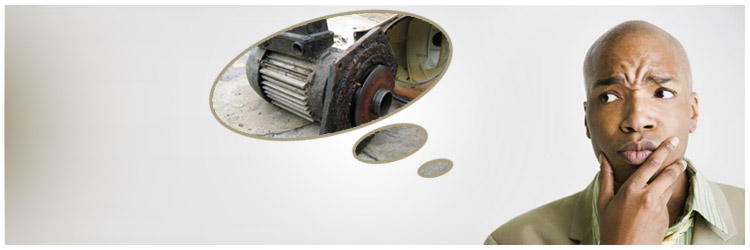
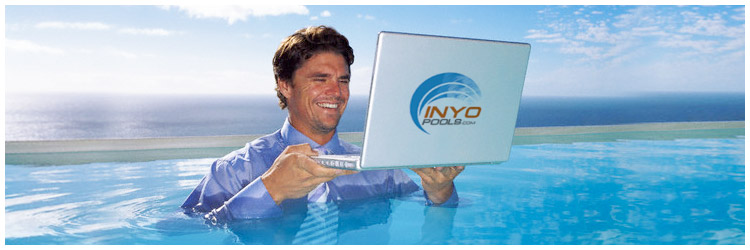
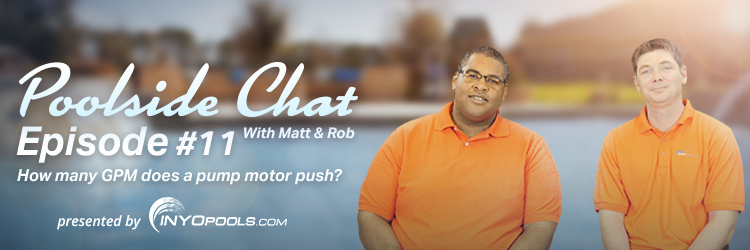
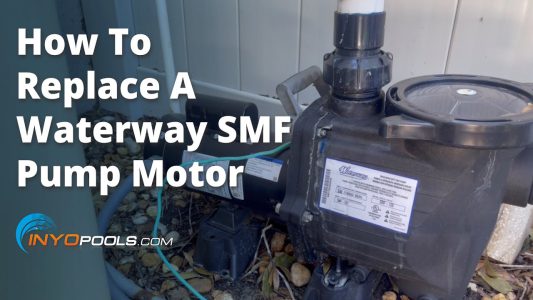
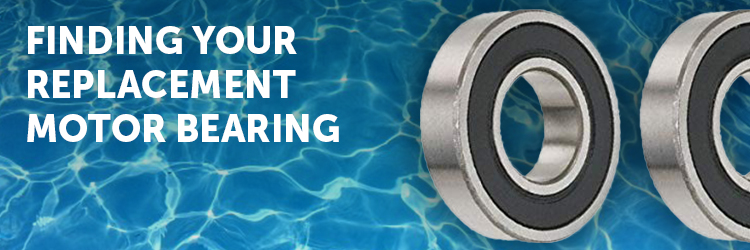






Hello i have a intex sand and saltwater filter. Set it up and i have power but its not making any sounds.. theres a red 7 or 1 on the main screen.. when i press any of the buttons i does nothing.. o chrcked the impeller and its free..
I am not familiar with Intex models; you may want to contact the vendor from whom you purchased it to determine if the item is defective.
I just went out to turn on my pool pump. It sounded as though it was going to prine and operate as it normally does, but suddenly just stopped. No sound just nothing. Now it wont come on at all. The only thing different is we had been having some electrical issues in our house with lights getting brighter when appliances come on and APS came attached a ground or neutral wire from our house to our neighbors because ours is not working. Would that cause a problem with our pool pomp?
Yes, power surges can damage electrical components. It could be something as simple as a blown capacitor, your voltage may have dropped out of the operating range for the motor.
My pool filter pump sounds like the propeller wants to go but then doesn’t and makes a quick click noise…reset button and test button dont make a difference. Have tried multiple outlets all working for other things except pool pump…I took pool filter apart and nothing is broken or rotted. Why is it not working?? Please help.
When a motor is making a clicking noise, it is usually the motor is not getting enough voltage. If your connections are loose or using the wrong gauge power cable, your motor can be deprived of the juice it needs to turn to speed. We go into more depth on this subject in this PSC Ep. #16 – Pump Motor Making Clicking Sound
i just replaced a motor. impeller wasnt turning very well when i installed brand new motor. not sure why. after wiring in, got humming noise but impeller would not spin. why? i put new shaft seal also
Do you have the motor set to the correct voltage? If you have a dual voltage motor (very common) they come set from the factory to 230 volts. If you are running 115 volts, you will need to manually switch the motor over. If the motor truly is new and you have eliminated any circuitry concerns then you may have a defective motor. Contact the vendor from whom you purchased the motor to get it replaced.
Hi just wondering if I have a simple issue or a more complicated one. I’m switching my pump to 115v from 230v to get enough power to my pool equipment to run a heat pump. The pump runs but pressure seems lower than before (1-2psi, used to be up at 7psi). Is there a switch out of phase on the pump, or is there another issue? The motor is definitely switchable.
My AO Smith pump displays “overcurrent fault” and advises to rotate the shaft. I did that and the shaft turns OK. When I turn the power on it hums for a second, then stops and then displays the “overcurrent fault” message again. I suspect it’s related to a power outage we had a few days ago. Could the power have surged when it came back, and damaged the capacitor maybe? Thanks for all the help you’ve given here, it looks like this page keeps you busy!
I just bought a Summer Waves quick set up. The pump is an RX600. Its leaking tons of water from the top and bottom over called polygroup several times. They aren’t very helpful and the instructions stink. Any advice?
Go to the dealer from whom you purchased the item and tell them it is defective. If it is a new item, they should replace it. Raise a stink about it, until they do.
I am not getting any power to my pool pump. I have replaced mini breaker and still have no power. Can you help?
Matthew,
First time pool owner and it has been a crash course. I mistakenly removed all of the DE and ran the pump for several months. Was getting a flow error but couldnt figure out why (i now know it was due to no DE). The motor has stopped working (no humming). Would running the pimp with no DE cause this? If I add DE, do you think the motor will restart?
hello, we were cleaning the pool, and when it was time to clean the pump out, we hooked everything back up. turned the pump on it came on,worked fine, then the pump shut off, did the reset and test came on, then the pump shut off, had to wait a few mi . did the reset, came on, until we got done vacuuming, cleaned the pump out again, after shutting pump off. then we tried to turn the pump back on after we got things back in and on, did the reset again, this time the pump did not come back on, we checked the fans,they work freely, the rod to the motor moves freely, we did the reset again, all we get is like a thumping noise, wants to start, but not working. could this be the compacitor?
It wouldn’t hurt to check the capacitor. Have you checked to voltage, or tried to put the motor on a different gfci/breaker?
We just tried to turn out pump on and it will not come on. We’ve checked the breakers & everything. Any ideas?
I have a brand new Vflex pool vac, everything has been replaced inside the vac. I replaced the pool pump, and the filter. My question is why does my vac clean half of the pool and Stop mid way of cleaning? Doesn’t matter where it starts from it still stops. There is no debris in the pool everything is clean. Why do I have this issue?
It could be defective. Have you contacted the dealer from which you bought it, or the manufacturer to run a troubleshoot?
Got my pool 4 days ago, set it up and no problem. Pump has been on for about 3 days. Went to check it this morning and pump not working. What could be the problem. It’s new. There is enough water in the pool.
What could be the problem? See the article above.
Other things to check: Pool Motor Troubleshooting
Pureline brand new 1.5hp above ground pool pump along with it’s now replacement 3/4hp pump will flow water but loses prime when vacuum hose attached. All gaskets checked. Even held all the vacuum hose under water in case of a hole. Still won’t vacuum.
It could be that the Pureline pump is not producing enough flow to prime with the additional length of hose. Have you tried reducing the length of hose to see if that corrects the issue?
pool is 18 x 33 cannot just clean half of it. It appears the air is coming in from the lid gasket. I will have to see if a different rubber gasket will make a tight seal. Had no issues for years until I switched to the pureline with its new wet end design.
My pump works fine when it’s in Recycle mode put pump to filter has no pressure
When you say the pump has no pressure, does the pressure gauge needle take a dip? Or does the needle spike and your return line flow slow?
The return line flow is slow.
It took 4 years, but better late than never.
Your filter is dirty, clean the sand or do a deep clean and possible an acid soak for your cartridge or DE grids.
My pool was working just fine, then a HUGE thunderstorm came thru. It dropped hail and lots of
water.. Now my pump is off and i’ve tried flipping ALL the breakers in the house to see if it resets but it’s still not working. All the pool pumps and equipment are under a covered patio. What can it be?
Did you have a lightning strike that could have fried your system and/or your breakers? That would be my first guess.
My pump comes on and off every few seconds what can be the problem, thanks
This could be an overheating issue. Most common causes of overheating are low voltage or excessive strain, like too large of an impeller or old bearings adding drag to the draft. The latter can usually be heard because bad bearings make a loud screeching noise.
You’ll need a multimeter or to call an electrician to check the voltage. For the bearings, you must remove the moor form the pump, and unscrew the impeller. Then with your hand (no tools,) try to spin the motor shaft. If the shaft does not freely spin, then your bearings may be rusting.
After getting a local company to put in a new liner, our pump seemed to be having issues with pressure. In order to run the polaris, you have to close off one of the inlets (from the pump back to the pool) so that you have enough water pressure to run the polaris.
Now the pump does not prime or move water. I cleaned the impeller to no avail. If I add a portable pump to the system and direct it’s output to the skimmer intake to the pump, I get enough water flow to run the system. But it’s still not enough to adequately filter the system.
Have you checked for air leaks in the suction lines leading to the pump? That would explain why the pump can’t prime/pull the water to itself; while the portable pump that is pushing the water does work.
The not starting is now and then, sometimes when we trip the breaker we hear a hum on the motor, give the motor a hard wack, it starts. Seems like something gets hung in the motor and when you wack it it must knock it loose.
Do you know if your motor has just one capacitor? Or does it have two? Also, if the latter, did you change both?
If there is a hum, most of the times it is a bad capacitor. If you hear a screaching or grinding noise while the motor is running it would be a bad bearing.
My pool pump sometimes does not come on, does not trip breaker. I have to pound the pump casing and then trip breaker. The capacitor has been replac, what else could be the problem?
So, does the breaker trip after you give the pump a jolt?
Since you have already changed the capacitor, you should check is the motor shaft is frozen/locked up. To do this, you must remove the motor from the pump, and unscrew the impeller from the shaft end. With the impeller removed, try spinning the motor by hand. If the shaft does not move or takes a lot of strength to do so, then the motor should probably be replaced. You can try to replace the bearings (Part 1, Part 2), but may not fix the issue.
And of course, before you do any of this motor removal, shut off the breaker to the pump.